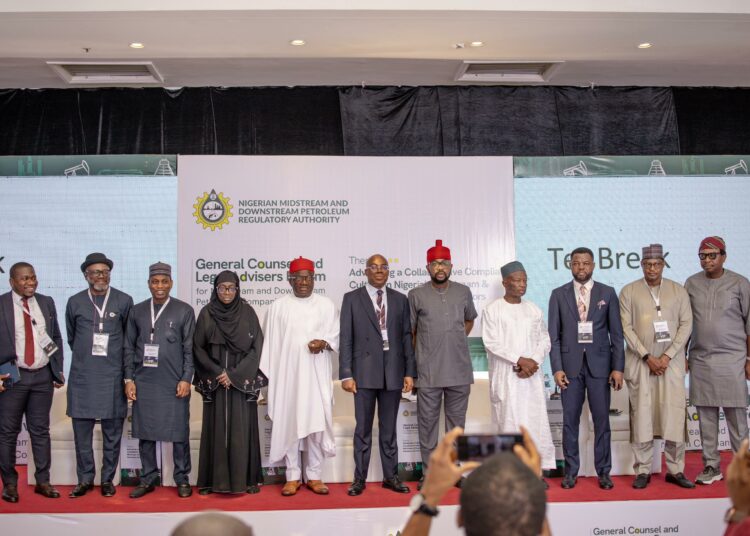Nigerian Midstream and Downstream Petroleum Regulatory Authority (NMDPRA) has emphasized the importance of compliance with regulations in the oil and gas sector, particularly in the midstream and downstream operations.
The Authority made the emphasis at the General Counsel and Legal Advisers Forum for the Oil and Gas Midstream and Downstream operators in Nigeria held in Abuja on Monday.
Themed “Advancing a Collaborative Compliance Culture in Nigeria’s Midstream and Downstream Petroleum Sectors”, the forum brought together stakeholders in the industry, aimed to enhance regulatory compliance and effective operations in the sector.
Speaking at the event, the NMDPRA Chief Executive Officer (CEO), Engr. Farouk Ahmed represented by the Executive Director, Distribution Systems, Storage and Retailing Infrastructure, Ogbugo Ukoha said this year’s edition of General Counsel and Legal Advisers Forum for the Oil and Gas Midstream and Downstream operators in Nigeria revolves around sharing insights for enhancing regulatory compliance and effective operations in the sector.
He highlighted the critical role of legal practitioners in promoting optimal regulatory compliance across the midstream and downstream energy business value chain.
He noted that the Petroleum Industry Act (PIA) 2021 has fundamentally restructured Nigeria’s petroleum industry, delineating regulatory responsibilities into upstream and midstream and downstream petroleum operations.
Ahmed emphasized that all operations in the midstream and downstream sector can only be conducted under appropriate licenses, permits, and authorizations granted by the Authority.
To strengthen regulatory compliance, the CEO said that the Authority is implementing an inclusive stakeholder process to streamline gazetted and published regulations.
He said: “The role of legal practitioners is critical across the midstream and downstream energy business value chain in the promotion of optimal regulatory compliance to all set rules and standards of operations in our complex operational and volatile market environment.
“I am sure that strategic and pragmatic solutions will be established from this forum that shall enhance the overall performance of the Midstream and Downstream sector as we all work towards the creation of shared value for our investors and most importantly the extensive market of Nigeria and the region. The Authority is grateful for the opportunity that you have given it to collaborate with you through this platform.
“The Petroleum Industry Act 2021 has fundamentally restructured Nigeria’s petroleum industry by delineating regulatory responsibilities of our Industry into the Upstream and the Midstream and Downstream Petroleum operations. The Act prescribes that all operations in the midstream and downstream sector can only be conducted under appropriate licenses, permits and authorizations granted by the NMDPRA and the authority is fully guided by the provisions of the law in providing regulatory oversight of the Industry.
“The PIA also mandated the NMPDRA to make Regulations concerning midstream and downstream petroleum operations in consultation with its licensees and stakeholders and we note and thank all of you for your effective participation and contributions in all the stakeholder consultative sessions that we have held over the years which has led to the issuance of all the regulations that have been gazetted for our sector.
“As a result of the feedback received from our stakeholders on the need to strengthen regulatory compliance through simplified and clearer regulations for the Midstream and Downstream operations, NMDPRA is implementing an inclusive stakeholder process of streamlining the gazetted and published regulations to mitigate the complexities of navigating and implementing numerous regulations; eliminate inconsistencies and repetitions across multiple regulations; streamline regulatory processes for ease of business; and encourage investments in the midstream and downstream petroleum industry.
“When we issue regulatory instruments, we require effective compliance. It is compliance with extant provisions of the law that allows continuity of operations and the grant or renewal of licences. We enforce compliance to ensure that operations are conducted safely, the environment and consumers are protected, and fair play is observed in the industry.
“Compliance with regulatory provisions is mandatory and beneficial for all the stakeholders of our Industry. It is therefore imperative for companies to adopt regulatory compliance as a critical element of their organizational and business culture.
“Compliance should not be reactive or be viewed as a business risk but rather as an integral part of business philosophy. Companies should internalize the fact that regulatory provisions are made to
enable businesses sustainability and to facilitate responsible
operations.
“We at NMDPRA assure you of our continued commitment to effective stakeholder collaborations that fosters ease of doing business, investor confidence and sustainable operations”.
Delivering a lecture titled “Legislation as an Enabler of Compliance, Investment, and Sector Growth: The Role of the National Assembly in Strengthening the Post-PIA Petroleum Landscape” at the event, the Deputy Speaker of the House of Representatives, Rt. Hon. Benjamin Okezie Kalu represented by the Chairman, House Committee on Petroleum Resources (Downstream), Hon. Ikenga Ugochinyere that the PIA has brought about significant improvements in the petroleum industry, including over $16 billion in investment commitments, 1.69 million barrels per day in oil production, and ₦50.88 trillion in revenue generation.
He said: “Just two years post-enactment, the impact of the PIA is undeniable. We have witnessed an astonishing $16 billion in investment commitments, a staggering 28,991% increase from our pre-PIA baseline of a mere $0.055 billion in 2020. These are not just numbers; they represent jobs, infrastructure, and a renewed sense of purpose for our nation’s most vital economic engine. And critically, our Oil Production in December 2024 reached 1.69 million barrels per day.
“It is with immense pride that I can state that Nigeria emerged as the leading destination for oil and gas investments in Africa in 2024, accounting for three out of four Final Investment Decisions announced by global oil and gas majors. This is not by chance; it is a direct consequence of the PIA’s meticulously crafted, investor-friendly provisions.
“This inflow of capital is a vote of confidence in Nigeria’s petroleum sector
and a validation of the National Assembly’s diligent work on the PIA.
“The impact of the PIA on sector growth is vividly evident in Nigeria’s oil production recovery and its subsequent contribution to our national economy. Our oil production reached 1.69 million barrels per day in November 2024, a significant milestone marking the highest level in 44 months. This is a dramatic turnaround from the sector’s previous decline, where production had plummeted by 23% between 2020 and 2022. We are not just recovering; we are surging forward.”
Presenting a paper on “Aligning the Legal Advisory Role with Regulatory Mandates and Operational Realities in the Midstream and Downstream Petroleum Industry”, the NMDPRA Secretary and Legal Adviser, Dr Joseph Tolorunse said legal advisers must be familiar with the licence regime under the PIA.
“Legal advisers must understand the licence regime under the PIA. They have various licences under the PIA. Don’t be mistaken, there are over 17 types of licences under the PIA that exist within the mainstream and outsourced space. So, legal advisors must understand the penal licence regime under the PIA.
“Legal advisers are encouraged to integrate alternative peaceful resolution into their internal policies, contracts, agreements, and peaceful management processes.
“Legal advisers must be accountable for monitoring and reporting involving regulations. Advising must be made in compliance, rather than reactive reaction. Engaging legal advisers and participating in industry consultation and supporting the government in relations and policy and advocacy. This approach ensures that businesses are not only compliant, but also adapted to policy trends”, he said.











